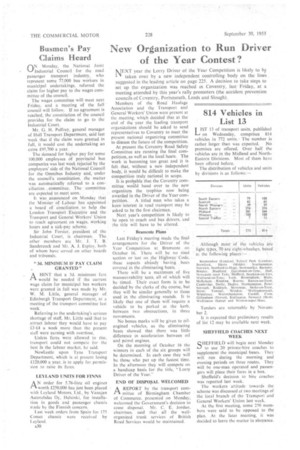Busmen's Pay Claims Heard
Page 32

If you've noticed an error in this article please click here to report it so we can fix it.
ON Monday, the National Joint Industrial Council for the road
passenger transport industry, who represent some 77,000 bus workers in municipal undertakings, referred the claim for higher pay to the wages committee of the council.
The wages committee will meet next Friday, and a meeting of the full council will follow. If no agreement is reached, the constitution of the council provides for the claim to go to the Industrial Court.
Mr. G. H. Pulfrey, general manager of Hull Transport Department, said last week that if the claim were granted in full, it would cost the undertaking an extra £95,700 a year.
The demand for higher pay for some 100,000 employees of provincial bus companies was last week rejected by the employers' side of the National Council for the -Omnibus Industry and, tinder the council's constitUtion, the matter was automatically referred to a conciliation committee. The -committee are expected to meet soon.
It was, announced on Monday that the Minister of .Labour has appointed a board of conciliation_ to help the London Transport Executive and the Transport and General Workers' Union to reach agreement on wag-es. Working hours and a sick-pay scheme.
Sir John Forster, president of the Industrial Court, is chairman. The other members are Mr. J. T. B. Sandercock and Mr. A. J. Esplcy, both of whom have served on other boards and tribunals.
"3d. MINIMUM IF PAY CLAIM GRANTED"
fiA HINT that a 3d. minimum fare would be needed if the current wage claim for municipal bus workers were granted in full was made by Mr. W. NI. Little, general manager of Edinburgh Transport Department, at a meeting of the transport committee last week.
Referring to the undertaking's serious shortage of staff, Mr. Little said that to attract labour they would have to pay
a week more than the present staff were earning with overtime.
Unless fares were allowed to rise. transport could not compete for the best in the labour market, he said.
New-castle upon Tyne Transport Department, which is at present losing £120,000 a year, is to apply for permission to raise its fares.




























































































